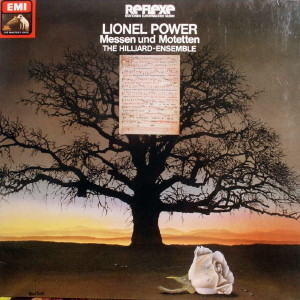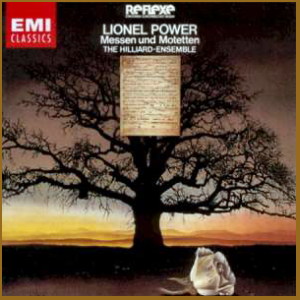 |
1 LP -
1C 069-46 402 - (p) 1981
|

|
| 1 CD - 8
26524 2 - (c) 2000 |
 |
| 1 CD -
CDM 7 63064 2 - (c) 1989 |
|
| Leonel
(Lionel) POWER (gest. en 1445) - Messen
und Motetten |
|
|
|
|
|
| Ave Regina -
Motette zu 3 Stimmen - (1, 2, 4,
6, 7, 5, 3) |
1' 47" |
|
| Gloria (5 parts)
- Fünfstimmig - (5, 1, 7, 6, 3,
4, 2) |
3' 10" |
|
| Beata viscera
- Motette zu 3 Stimmen - (1, 5,
7, 6, 4, 3, 2) |
1' 26" |
|
| Credo - Zwei-
bis fünfstimmig - (5, 1, 7, 6,
3, 4, 2) |
4' 12" |
|
| Sanctus
- Vierstimmig - (1, 3, 6, 4, 5,
2) |
3' 29" |
|
| Agnus
Dei - Vierstimmig - (1, 3,
6, 4, 5, 2) |
3' 48" |
|
| Salve Regina
- Motette zu 3 Stimmen - (1, 2,
6, 4, 5, 3) |
6' 55" |
|
|
|
|
| Missa "Alma
redemptoris mater" -
Dreistimmig - (1, 2, 6, 4, 5, 3) |
|
|
| - Gloria |
3' 41" |
|
| -
Credo |
5' 23" |
|
| - Sanctus |
4' 13" |
|
| - Agnus Dei |
6' 06" |
|
| Ibo
michi ad mortem - Motette zu 3
Stimmen - (1, 3, 5) |
3' 05" |
|
| Quam
pulchra es - Motette zu 3
Stimmen - (7, 6, 3) |
4' 10" |
|
|
|
|
THE HILLIARD
ENSEMBLE / Paul Hillier, Leitung
|
|
| 1.
David James, Kontratenor |
|
| 2.
Ashley Stafford, Kontratenor |
|
| 3.
Paul Elliott, Tenor |
|
| 4.
Leigh Nixon, Tenor |
|
| 5.
Roger Covey-Crump, Tenor |
|
| 6.
Paul Hillier, Bariton |
|
| 7. Michael George, Baß |
|
|
|
| Die Zahler
bezeichnen die Besetzung der
einzelnen Stucke in der
Reihenfolge der Aufstellung bei
der Aufnahme von links nacht
rechts. |
|
Die Kompositionen
sind in chronologischer
Reihenfolge angeordnet.
|
|
Die Werke der
ersten Seite - mit Ausnahme des
"Salve Regina" - entstammen dem im
British Museum, London
aufbewahrten "Old Hall
manuscript", entstanden vor 1413.
|
|
|
|
|
|
Luogo
e data di registrazione |
|
Evangelische
Kirche, Séon (Svizzera) - 8-11
settembre 1980 |
|
|
Registrazione: live /
studio |
|
studio |
|
|
Producer / Engineer |
|
Gerd
Berg / Klaus L. Neumann /
Johann-Nikolaus Matthes
|
|
|
Prima Edizione LP |
|
EMI
Electrola "Reflexe" - 1C 069-46
402 - (1 lp) - durata 52' 53" -
(p) 1981 - Analogico |
|
|
Prima Edizione CD |
|
EMI
"Classics" - CDM 7 63064 2 - (1
cd) - durata 52' 53" - (c) 1989 -
ADD |
|
|
Edizione CD |
|
EMI
"Classics" - 8 26524 2 - (1 cd) -
durata 52' 52" - (c) 2000 - ADD |
|
|
Note |
|
Aufgenommen
in Zusammenarbeit mit dem WDR.
|
|
|
|
|
|
LEONEL
POWER
In
the early years of the 15th
century, English music was
recognised as the leading
force in Western music and
John Dunstable (d. 1453) as
its leading composer. It does
not diminish Dunstable’s
reputation to say that the
music of his
older contemporary Leonel
Power (d. 1445) is of
comparable stature and that
several younger composers also
contributed to the eminence of
the English sound, known
abroad as "la
contenance angloise". This
sound in fact derived from a
mixture of French and more
traditional English styles,
together with some rhythmic
impulses from Italy - but it
was indeed a sound. The
sweetness of thirds and sixths
was exploited for practically
the first time in Western art
music, expanding the harmonic
language and encouraging the
use of fuller sonorities,
which has often been a trait
of English music. To this
Leonel added his own peculiar
brand of waywardness that
happily defies all analysis.
In the
sound of a particular music
lies its immediate appeal
which will either attract a
listener or not: but there is
always another aspect awaiting
our deeper appreciation
(though ideally the two are
inseparable): its structure. In the
structure of music is based
the true foundation of its
expressive power, and it is in
the history of musical form
that Leonel’s significance
lies no less than in the
sonorities of his music. The
major achievement of this
English school was to
establish the cyclic tenor Mass as
a form of major importance,
and Leonel's Missa alma
redemptoris mater is
probably the earliest example
we have of such a work. The
bulk of Leonel’s earlier music
is found in the Old Hall
manuscript, (OH), an important
collection of English
polyphony (mostly settings of
individual Mass
movements) dating from the
late 14th century. In some
ways this collection marks the
culmination of medieval
English music and it is
unusual, perhaps significantly
so, in providing us with the
names of many of its
composers. Anonymity is one
trait common to most aspects
of medieval art that has been
equally uncommon ever since.
The medieval composer was a
craftsman in sound whose music
sought to reflect the
harmonious proportions of the
universe (the music of the
spheres) and the perfection of
God; self-expression was not
his immediate purpose. This
sense of order and number
plays a profound part in
medieval music, and while it
has never ceased to be
important, has again today
become a prominent aspect of
the composer's craft. In the
sudden flush of names provided
in OH, Leonel’s clearly
dominates; over twenty pieces
can be credited to him, while
no other composer reaches
double figures.
Leonel is first encountered
among the records of November
1419 for the Household Chapel
of Thomas, Duke of Clarence,
(who was Henry V’s brother,
and thus heir presumptive to
the throne) where he appears
as clerk and instructor of the
choristers. Later, after
Clarence’s death, he was
received into the fraternity
of Christ Church Cathedral
Priory, Canterbury, on May14th,
1423 - an honour rather than
an appointment. In
September 1438 he appears on a
legal document, also in
Canterbury, styling himself
“armiger” (gentleman). Then
from 1439 he appears regularly
in the cathedral archives at
Canterbury, where his duties
seem to have been light and to
have involved serving as the
first Master
of the Lady Chapel choir. A
private chronicle records that
he died on June 5th,1445,
within the cathedral
precincts, and was buried the
following day. In
addition to his music there
has also survived a treatise
on counterpoint - designed as
a practical guide in the
training of choirboys, and
doubtless belonging to this
latter period in his life.
These few facts, a bare
skeleton, may be tentatively
fleshed out following the
researches of Professor
Bowers. It
may be assumed, working
backwards, that Leonel was
born in about 1375, so that
his earliest extant music, in
OH, probably dates from around
the turn of the century. Henry
IV’s
sons were Henry (later Henry
V), Thomas (Duke of Clarence),
John (Duke of Bedford) and
Humphrey (Duke of Gloucester).
Thomas was created Duke of
Clarence in 1412 and it may be
assumed that his household,
including the Chapel, was
established at the same time.
Leonel probably served from
this period until 1421, when
the Duke was killed while
fighting in France. During his
time in the Chapel Leonel
would have spent at least a
year in northern France in
areas then occupied by the
English. When his brother
Henry returned to England for
his wedding, Thomas remained
as Lieutenant of France, At
his death, the household would
have been dispersed and the
next period in Leonel’s life,
1421-1438, is obscure.
His recorded fraternity with
Christ Church Priory in 1423
is no proof that the then
remained in Canterbury or had
any duties there, although he
may already have begun to feel
an identity with the place
where he certainly lived out
his final years. It is
generally accepted that
Dunstable served in the Chapel
of John, Duke of Bedford -
Clarence’s younger brother;
and it was been proposed that
Leonel may have done likewise.
There is no proof of this at
all, but it would partly
explain why so much of these
composers works survive in
foreign sources as Bedford
spent much time abroad, and
also why an important work
(the Missa Rex Seculorum)
survives in two sources,
attributed in one to Dunstable
and in the other to Leonel.
The final period of Leonel's
life involved him in work at
Christ Church Priory. The
establishment there of a Lady
Chapel as a secular adornment
of the monastic Cathedral
liturgy fits the overall
pattern of religious life at
the time. The Lollard heresy,
seeking amongst other things
to simplify the service ritual
and its elaborate music,
provoked a reaction that was
very favourable to the English
musician, who was encouraged
to produce a yet richer art to
confute the teachings of
Wycliffe and his followers,
(whose spiritual descendants
eventually had their way a
century later under the
guidance of Thomas Cranmer).
This receptive atmosphere must
have contributed in part to
the preeminence of English
music at the turning of the
14th century, as found in OH,
leading to the creation of la
contenance angloise.
(cut).
Paul
Hillier
|
|
|
EMI Electrola
"Reflexe"
|
|
|
|

